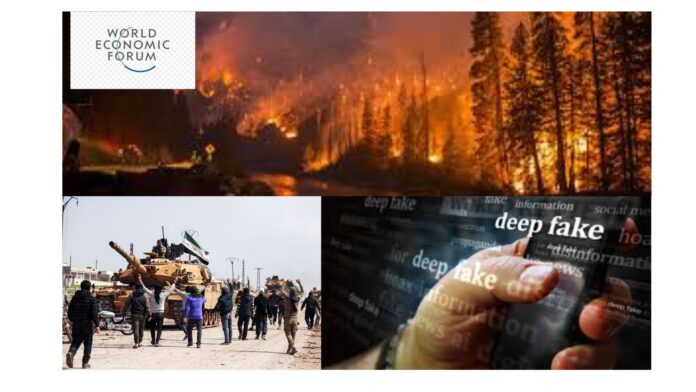Geneva, Switzerland – The World Economic Forum’s 20th edition of the Global Risks Report, published today, highlights an increasingly fragmented global landscape where mounting geopolitical, environmental, societal, and technological challenges jeopardize stability and progress. While economic risks are less prominent in this year’s survey, they remain deeply interconnected with societal and geopolitical tensions.
The report identifies state-based armed conflict as the most urgent global risk for 2025, with nearly a quarter of respondents ranking it as their top concern. Misinformation and disinformation persist as major short-term threats, marking the second consecutive year these issues have dominated risk perceptions due to their erosion of societal trust and deepening divisions. Additional prominent short-term risks include extreme weather events, societal polarization, and cyber-espionage and warfare.
Peter Giger, Group Chief Risk Officer, Zurich Insurance Group:
“With the planet surpassing the 1.5°C warming threshold in 2024 for the first time, the stakes are sky-high. The Report’s survey results clearly show that experts see climate risks as being critical over the long term, but as recent news headlines show us, they also require our short-term attention. Already today we must focus on environmental risks – from extreme weather to biodiversity loss.
Immediate action is critical to mitigate the worst impacts of climate change, and to build resilience. The costs of inaction and the lack of global cooperation are having an adverse impact. However, I remain optimistic as I believe humankind can find societal and technological solutions to avert the worst. The biggest risk would be to sit back now and say there’s nothing we can do. It’s not too late.” he added.
Environmental Risks in the Long Term
The longer-term outlook is dominated by environmental concerns, with risks such as extreme weather events, biodiversity loss, ecosystem collapse, critical changes to Earth’s systems, and natural resource shortages topping the 10-year rankings. Pollution is also recognized as a significant short-term risk, reflecting growing awareness of its severe impacts on health and ecosystems. Extreme weather events remain a consistent threat across immediate, short-term, and long-term horizons.
Technological risks, including the spread of misinformation and the potential adverse effects of AI, further complicate the long-term risk landscape.
“Rising geopolitical tensions, a fracturing of global trust, and the climate crisis are straining the global system like never before,” said Mirek Dušek, Managing Director at the World Economic Forum. “In this environment of deepening divides and cascading risks, global leaders face a critical choice: to foster collaboration and resilience or risk compounding instability. The stakes have never been higher.”
Fractured Systems, Fragile Futures
Based on insights from over 900 global risk experts, policymakers, and industry leaders surveyed in late 2024, the report paints a sobering picture of the next decade. Nearly two-thirds of respondents foresee a turbulent or stormy global landscape by 2035, driven by escalating environmental, technological, and societal challenges.
Over half of respondents predict some level of instability within the next two years, underscoring the breakdown of international cooperation. Long-term projections reveal even greater hurdles, with collaboration mechanisms expected to face increasing strain. Societal risks such as inequality and polarization rank high in both short- and long-term perspectives, while concerns over illicit economic activity, debt burdens, and strategic resource concentration highlight vulnerabilities that could destabilize the global economy. All 33 risks in the report’s rankings show an increase in severity over the long term, reflecting concerns about their intensifying frequency and impact.
“From conflicts to climate change, we are navigating interconnected crises that demand coordinated, collective action,” said Mark Elsner, Head of the Global Risks Initiative at the World Economic Forum. “Rebuilding trust and fostering cooperation are more urgent than ever. The cost of inaction could affect generations to come.”
A Decisive Decade: Collaboration as the Key to Stability
As global divisions deepen, 64% of experts anticipate a fragmented international order shaped by competition among major and middle powers. Multilateralism is under significant strain, yet isolationism is not a viable solution.
The next decade presents a critical opportunity for leaders to address interconnected risks and reform governance structures. By prioritizing dialogue, strengthening international ties, and fostering collaboration, nations can counteract the growing instability and lay the groundwork for a sustainable, inclusive future.
David Jacob, Chief Executive Officer, Asia, Marsh McLennan:
“As highlighted in the Global Risk Report 2025, the interconnected challenges of rising conflicts, environmental issues, and misinformation quires urgent collective action. Leaders must adopt a strategic approach to risk management that prioritizes collaboration and trust-building. Threats of rising protectionism also pose significant challenges to our already fragile global supply chains.
Proposed regulations restricting data flows and escalating cyberattacks will further increase costs and hinder the adoption of innovative digital technologies and AI. By proactively enhancing supply chain resilience and investing in strong cybersecurity, businesses can better navigate these challenges and thrive in a complex global risk landscape.”
About the Global Risks Report
The Global Risks Report is the World Economic Forum’s flagship publication on global risks, now in its 20th edition. Produced by the Global Risks Initiative at the Forum’s Centre for the New Economy and Society, it draws insights from the Global Risks Perception Survey, engaging over 900 leaders from business, government, academia, and civil society. The report offers a comprehensive analysis of immediate, short-term, and long-term risks, equipping leaders with foresight to navigate emerging challenges and foster a more resilient global future.




